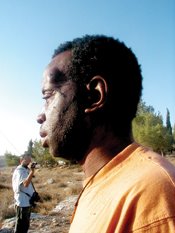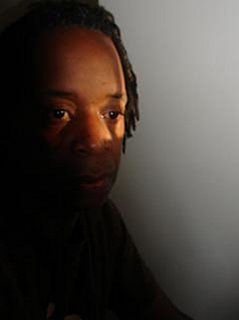September 11, 2006
State of Chutzpah
By URI AVNERY
Jerusalem.
IN EVERY language there are some words that cannot be properly translated into any other. It seems that they express something intimately connected with the speakers of that language and rooted in their history, traditions and reality. Such words become international expressions, appearing in other languages in their original form.
For example, the German word "Schadenfreude". Or the English word "gentleman" and the American word 'business". Or the Russian word "pogrom" (originally meaning devastation). Or the Japanese word "kamikaze" (divine wind, the title given to suicide bombers). Or the Mexican "manana" and the similar Arabic "bukra" (both meaning tomorrow. The difference between them? The joke says: Bukra is not so urgent.) And, lately, the Palestinian "intifada".
The most prominent Hebrew addition to this international lexicon is "chutzpah", a word that has no equivalent in any other language. Some English words may come close (impertinence, cheek, insolence, impudence), but none conveys the full meaning of this Hebrew-Yiddish expression. It seems that it reflects something that is especially characteristic of Jewish reality, which was transferred to the State of Israel, which defines itself as a "Jewish State".
* * * THE PRESIDENT of Israel is supposed to symbolize the common denominator of all our citizens. Therefore it is proper for him to symbolize this trait, too.
And indeed, it is difficult to imagine a more quintessential chutzpah than the behavior of His Excellency, President Moshe Katzav. He is the supreme symbol of Israeli chutzpah.
Katzav has been accused of the sexual harassment of several women who worked for him in the President's office, as well as in his earlier public offices. At least three of them accused him of rape.
Such accusations are, of course, far from a conviction. The investigation is still going on.
The President, like any other citizen, must be presumed innocent until found guilty in court. It is quite possible that in the end he will not even be indicted, or--if this happens--that he will be acquitted, though perhaps only for lack of proof.
But that is not the point. The point is that the President of the state, like Caesar's wife, must be above suspicion. It is sufficient that there be reasonable grounds for suspecting the President--such as a criminal investigation--for him to resign his office. If he is later acquitted, so much the better.
Let it be clear: I have nothing against Moshe Katzav personally. On the contrary, I have praised him on TV for his readiness, in spite of belonging to the Likud, to listen to Arab citizens. I once brought to him a delegation of leaders from the West Bank, and he treated them with the utmost courtesy.
But as a citizen of Israel I am ashamed. The affair in which he is involved dishonors the office and, indirectly, the entire state. "Citizen Number 1" has become the butt of jokes.
One thing can be said in his favor: in his chutzpah, too, he symbolizes the state, or, at least, the ruling elite.
THE KING of chutzpah, its very personification, is the Prime Minister, Ehud Olmert.
If he had a gram of shame, the minimum of decency, he would have resigned the day after the cease-fire. There is no need for an inquiry to decide the obvious: that he is guilty of a long line of disasters that have caused the death of a thousand human beings, including almost 200 Israelis--men, women, old people and children.
It can be debated of what exactly to accuse Olmert: the starting of an unnecessary and hopeless war (as I believe), or "only" the incompetent conduct of the campaign from start to finish. But any one of these is enough for a decent person to go home and wait there for the results of the inquiries.
But Olmert does not even dream of doing that. He continues as if nothing has happened. In the US this is called "stonewalling". He stands there naked like the emperor in the children's story. All the promises he made only a few months ago, during the election campaign, have dissipated like smoke in the wind. He has no political plan left. He has not even the ability to carry out any plan, if he had one. He has no time to think about anything, except his political survival.
Winston Churchil once said about a former British Prime Minister: "The right honorable gentleman sometimes stumbles on the truth, but he always hurries on as if nothing has happened." Olmert, similarly, hurries on his way.
He objects to the investigation of the war through the instruments prescribed by law. He tries to set up a whitewash investigation by an unquestioningly loyal group chosen by himself. He goes on using every opportunity to make another of his banal, cliché-laden speeches, which do not contain a single word of truth, or even of interest.
That is chutzpah. Not chutzpah in the harmless, jocular sense often signified by this word, but a dangerous, rude and aggressive chutzpah. In practice, the state remains without leadership. It is unable to take bold decisions in a situation which demands them. His personal survival overshadows everything else, from the problem of the prisoner exchange to the daily killing of Palestinians in the West Bank and Gaza.
It must be stated again and again: the state is not private property. It is not some booty that belongs to whoever has succeeded in laying his hands on it, accidentally or not. It is a national treasure entrusted by the citizens to a particular politician, which must be given back by him if he is proven unable or incompetent to exercise his duties. Any other attitude is chutzpah.
* * * NO NEED to waste words on the chutzpah of Amir Peretz. It speaks for itself.
He bears personal responsibility for all the blunders of the war, from the unthinking decision to start it, up to the last military decision. From the boastful beginning to the bitter end he showed a shocking inadequacy. A decent person would have resigned the moment the guns fell silent. His refusal is chutzpah.
The chutzpah of Peretz is almost bizarre. He achieved political power on the basis of his explicit promise to carry out basic social reforms. Not only did he ignore this promise, he did the very opposite. His effort to continue now as if nothing has happened and even to present himself as a social leader is pathetic.
* * * BUT EVEN these three champions--Katzav, Olmert and Peretz--pale in comparison with Dan Halutz.
Together with likeminded people I demonstrated opposite the Ministry of Defense when he was sworn in as Chief-of-Staff. It was clear to us that such a person, who had behaved as he did behave and who had said what he did say was not fit to lead the Israeli army. But even we did not foresee in our wildest imagination that in such a short time, and in such an extreme manner, he would confirm our darkest forebodings.
From a purely military point of view, Halutz is the greatest failure in the annals of the Israeli army. From a human point of view, he justified the prophecy that he has a brilliant future in the court of The Hague. From a political point of view, his understanding equals that of a primary school pupil (if the pupil community will excuse me.)
The boastfulness of the Air force, the arrogance of an incompetent general, the brutality of a person who is able to bring tragedy to hundreds of thousands without batting an eyelid--all of these were exposed during the war.
As has been published, he told the government on the sixth day of the war that from that moment on there was no possibility of achieving anything more. Said so and did not demand to stop, said so and went on with the killing and destroying, day after day, night after night. On the eve of the cease-fire he sent his soldiers into a militarily senseless, completely unnecessary offensive, in which the lives of 33 of his soldiers were sacrificed.
But Dan Halutz does not resign. It doesn't even enter his mind. This week, at a meeting of former generals, accusations and even insults were slung at him, and he did not budge.
A decent person would have resigned at once. It is clear that an officer who has failed in this manner, who is so much distrusted by the army, cannot carry out the general overhaul demanded now--the replacing of the entire general Staff, and especially the replacing of all the commanders who were in charge of the campaign. Can a person who refuses to bear the responsibility for this entire bungled campaign demand that his subordinates shoulder theirs?
When chutzpah is the norm in the army--what chance is there for its rehabilitation?
* * * I KNOW, there are several arguments for keeping the champions of chutzpah in office. There are no obvious alternatives. The bad may be replaced by worse. Olmert's resignation may lead to new elections, in which the more extreme Right may win. His resignation may also lead to the inclusion in the government of Avigdor Liberman, compared to whom the Frenchman Le Pen and the Austrian Haider are bleeding-heart liberals. Who can guess who and what might come after Halutz?
All these arguments are valid, but they must give way to one simple demand: Chutzpah must not be allowed to reign. The acceptance of personal responsibility by the directors of the government and the army is an essential feature of a healthy society. It is a simple moral imperative, like the categorical imperative of Kant, an imperative that does not allow for any compromise.
The Talmud warns against "chutzpah towards heaven" (God). We must warn against chutzpah towards civil society, the sovereign on earth.


